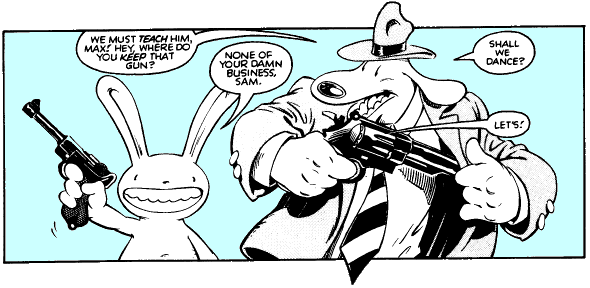

| March 2001 |
|
| Steve Purcell: Sam & Max, Freelance Police | |

It's not Proust, but I keep it near my desk, re-read it when I want to feel happy, and cite favorite lines to other addicts ("I'm a lagomorph, Sam! Look it up!" "You crack me up, little pal!"). That's quality humor, Jack.
About the only problem is that there isn't much of it. There's one TPB (Surfin' the Highway), and that's it. Well, also a cartoon series that's said to be severely watered down, and an excellent video game.
Update: Great news: Purcell is creating new Sam & Max comics online. They look beautiful, but they're done with a very weird method-- you have to mouse over the panels to see the dialog (sometimes you get little animations, too). Plus there's no quick way to see the current episode. But it's actual Sam & Max, so, deal with it. Telltale Games is apparently working at some glacial pace on a new Sam & Max game, too.
| Aaron McGruder : The Boondocks | |
Heh. It's not many comic strips that'll make me talk like that. The Boondocks features two inner-city Chicago boys who move with their grandfather halfway across the country to a very nice, very white suburb. Hey, culture clash! Huey is a miniature black radical socialist; his younger brother Riley wants to be a thug as bad as his rapper heroes. Granddad is befuddled by both of them. He's not interested in much besides fishing and watching cable; when the boys get out of hand there's his belt to answer to.

Huey spouts endless black-studies rhetoric, but the main joke of the strip is that what the family encounters is not out-and-out racism but ignorance and puzzlement. It isn't that they're opposed to freeing Mumia-- they don't know who Mumia is. (On the other hand, they're perfectly familiar with Snoop Doggy Dogg and O.J.)
The other joke is that no one takes Huey seriously. His granddad just ignores his tirades; his brother thinks he's a nerd; the biracial girl next door, Jazmine, sometimes argues with him and sometimes accepts him; the old ladies in the neighborhood pat him on the head. None of this makes the least impression on Huey.
Still, something of his own acerbic worldview seeps through. Few of us are going to buy it all, but we can appreciate his own amusement and frustration with the others-- his low-life-wannabe brother, Afro-denying Jazmine and her over-assimilated father, the hollow pieties of his school, which soberly prepares to reach out to a disadvantaged child, but doesn't know what to do with an intelligent, politically rebellious one.
McGruder has obviously learned from Garry Trudeau. His own politics are probably within spitting distance of Huey's; but he gives everybody else a chance to speak, and he lets Huey get to absurd extremes sometimes (Santa Claus is responsible for the crack epidemic). And there are no villains-- at least, no onscreen ones. (Trudeau made the wrong decision, I think, to abandon his own similar policy. His Nixon was on the wrong side, but was recognizably human; his Newt Gingrich was completely humorless.)
The art deserves mention. It's effective in a stylized, sketchy way, and the shading makes it look unlike the other comics on the newspaper page. (Though it makes for a lousy scan.) Curiously, the kids look like nothing so much as manga characters.
Most 'black' strips have chosen a setting in the city-- Jumpstart, Curtis, Wee Pals-- but McGruder senses that to shine a light on race in this country, you need to mix it up, to make worlds collide. And he gets it right more than Hollywood, whose response to multiculturalism is to dampen it down, to pretend that both friendships and street gangs are harmoniously integrated. McGruder's greatest honesty is to show that race relations are still mostly characterized by incomprehension and ignorance. That may be better than outright hatred, but it still can be criticized-- or better yet, mocked.
Ironically, what I think McGruder doesn't come to terms with is precisely the browning of America. Are there really suburban (as opposed to rural) neighborhoods which are still all-white? And why aren't there any Latinos or Asians in this town?
Update: All this is based on the first trade paperback; Boondocks has gone downhill in much the same way Mordor did when Sauron moved in. There's no story at all now, just Huey running off at the mouth about George Bush. McGruder doesn't even draw it any more. You have to be really, really clever to make political invective work, and he's not even trying any more.
